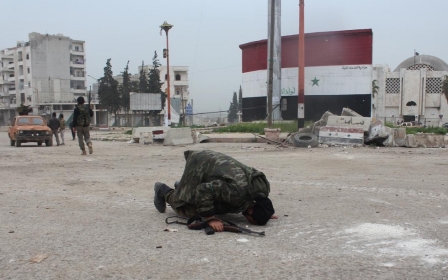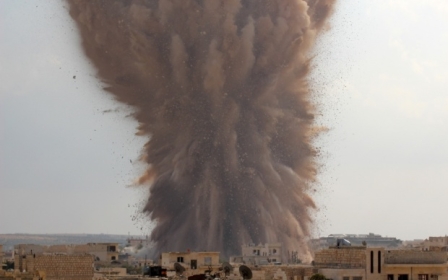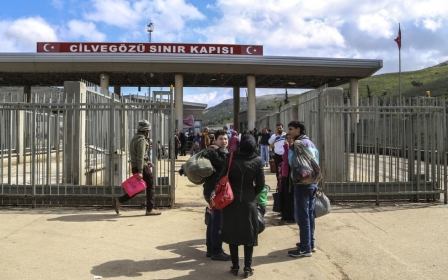Syria's Assad claims expansion of Islamic State since US airstrikes

Syrian President Bashar al-Assad claimed on Sunday that the Islamic State (IS) has expanded its influence and won more recruits since the beginning of US-led airstrikes targeting the group.
Assad said the US and its allies wanted to "sugar coat" the impact of the airstrikes, while speaking to American news outlet CBS.
The embattled Syrian leader told CBS host Charlie Rose his forces have had some benefit from the strikes against IS but that the group has grown since the beginning of the operation last year.
"Sometimes you could have local benefit but in general if you want to talk in terms of ISIS, actually ISIS has expanded since the beginning of the strikes,” he said, using an alternative acronym for IS.
The US and a coalition of Arab states began airstrikes in Syria last September, building upon an aerial campaign already hitting the militant group in Iraq.
In 2014, after capturing large swathes of territory, IS declared an “Islamic caliphate” that traverses the borders of Iraq and Syria.
Assad claimed IS is attracting 1,000 fresh recruits per month in Syria.
"And Iraq - they are expanding in Libya and many other al-Qaeda affiliate organisations have announced their allegiance to ISIS. So that's the situation," he said.
Syria has endured four long years of fighting, after demonstrations against Assad’s rule were brutally put down in March 2011.
Assad has been accused of collaborating with IS, and other al-Qaeda affiliated groups, who have reportedly sold the Syrian government oil as a tool for raising funds. Rebels battling Assad have accused him of releasing militant prisoners in order to boost IS ranks and delegitimise the entire movement against his rule.
More than 210,000 people have died in the civil war, which shows no sign of abating, and Assad has faced widespread calls to step down from the presidency.
Charlie Rose asked Assad for answers on reports that 90 percent of casualties in the war have been caused by his forces.
The Syrian leader said the accusation was “not realistic”.
“We cannot win the hearts and minds of the Syrians while we are killing Syrians,” he said. “It’s against our interest – as the government – to kill the people. What’s the benefit of killing the people?”
When asked under which circumstances he would give up power, Assad said, "When I don't have the public support. When I don't represent the Syrian interests, and values."
Rose replied: “How do you determine that [support]?”
“I have direct contact with the people,” Assad replied. “I sense. I feel. I’m a human.”
“The war was a very important lab for this support. If they [the people] don’t support you they could go and support the other side but they didn’t […] that’s very clear. That’s very concrete.”
Assad criticised regional powers for opposing his continued rule, describing Saudi Arabia – which has supported rebel groups – as an “anarchic autocracy” that shares “the same Wahhabi” ideology as IS. He accused Turkish President Recep Tayyip Erdogan – who has called for Assad’s fall – of being a “Muslim Brotherhood fanatic” suffering from “political megalomania”.
Dialogue with the US
Assad said he was "optimistic" about starting dialogue with Washington after US Secretary of State John Kerry's comment earlier this month that the US would "have to negotiate in the end" with the Syrian president.
"We always wanted to have good relation with the United States," he said. "We never thought in the other direction. It's a great power. Nobody, not a wise person, would think of having bad relations with United States."
Asked whether he could have a good relationship with a country that thinks he should not be in power, Assad said, "No, that's not going to be part of the dialogue that I mentioned earlier. This is not their business. We have Syrian citizens who can decide this."
Following Kerry's remarks, Washington backtracked to its previously stated position that Assad had lost his legitimacy and must leave power in order to establish peace in the war-torn country.
Assad brushed aside as a disinformation campaign claims that his forces were behind a recent deadly chlorine gas attack on an opposition-held town, and suggested that the method was ineffective.
"This is part of the malicious propaganda against Syria. First of all, the chlorine gas is not military gas. You can buy it anywhere," Assad said, indicating that if anyone had used it, it was opposition forces.
The Syrian government allegedly launched a chlorine gas attack on 17 March on a town in the north-west province of Idlib, killing a family of six, including three children.
Reports of the attack followed a 6 March UN Security Council resolution that condemned the use of chlorine attacks in Syria. Opposition groups accused the government of carrying out the attack.
"It's not used as military gas. That's very self-evident. Traditional arms are more important than chlorine, and if it was very effective, the terrorists would have used it on a larger scale," Assad said.
Medical human rights organisation Doctors Without Borders said symptoms described by medical staff at a local hospital indicated the presence of chlorine poisoning.
New MEE newsletter: Jerusalem Dispatch
Sign up to get the latest insights and analysis on Israel-Palestine, alongside Turkey Unpacked and other MEE newsletters
Middle East Eye delivers independent and unrivalled coverage and analysis of the Middle East, North Africa and beyond. To learn more about republishing this content and the associated fees, please fill out this form. More about MEE can be found here.




